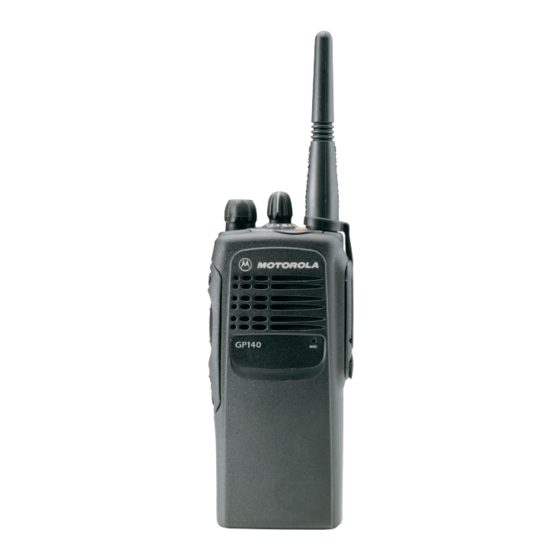Motorola GP280 Manuale d'uso - Pagina 14
Sfoglia online o scarica il pdf Manuale d'uso per Radio bidirezionale Motorola GP280. Motorola GP280 46. Professional radio, power distribution and controller
Anche per Motorola GP280: Manuale d'uso (46 pagine), Informazioni sul servizio (32 pagine), Informazioni sul servizio (30 pagine), Informazioni sul servizio (30 pagine)

UG_240_280_EN.fm Page 10 Wednesday, August 14, 2002 10:30 AM
•
Time-Out Timer Warning – Your radio's time-out
timer limits the length of your transmission time.
When you are pressing the PTT switch (trans-
mitting), a short, low-pitched warning tone will
sound four seconds before the allotted time will
expire.
•
Time-Out Timer Timed-Out – If you hold down
the PTT switch longer than the time-out timer's
allotted time, a continuous, low-pitched tone will
sound, indicating that your transmission has
been cut off. This tone will continue until the PTT
switch is released.
•
Phone Busy – A "bah-bah-bah-bah" tone when
telephone interconnect is accessed indicates
that all available modes are busy and the radio is
in queue for the next available phone line.
•
Call Alert (Page) Received – A group of four
medium-pitched tones every five seconds indi-
cates that your radio has received a Call Alert
page.
•
Call Alert (Page) Sent – A single medium-
pitched tone (central acknowledge), followed by
a group of four medium-pitched tones indicates
that a Call Alert page sent by your radio has
Downloaded from
www.Manualslib.com
manuals search engine
•
Private Conversation Call Received – A group of
two medium-pitched tones indicates that your
radio has received a Private Conversation call.
This sequence is repeated every five seconds
for approximately 20 seconds for enhanced
Private Conversation.
•
Trunked System Busy (Trunked Systems Only) –
A "bah-bah-bah-bah" tone when a trunked
system is accessed indicates that all available
channels are busy and the radio is in queue for
the next available channel.
•
Call Back (Trunked Systems Only) – A group of
three medium-pitched tones (di-di-dit) indicates
that a talkgroup is now available for your
previously requested transmission.
